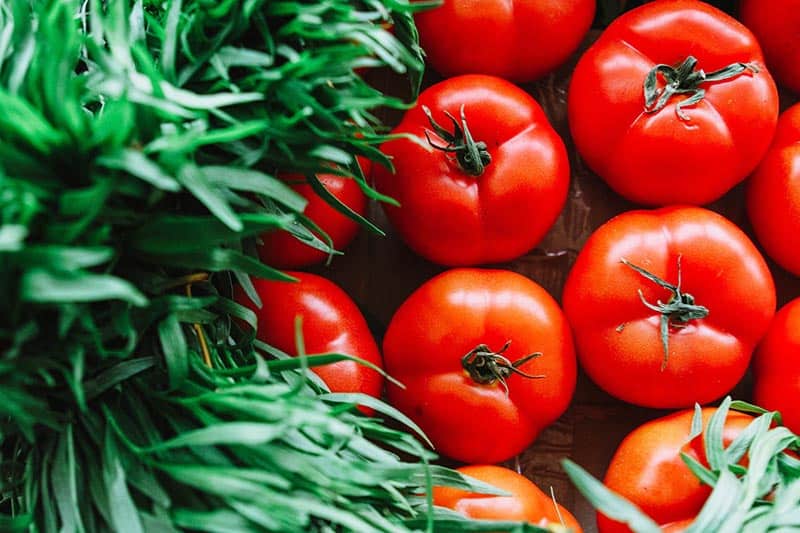Are you looking for meaningful Vegetarianism statistics or simply facts and figures about vegetarian nutrition? Then you've come to the right place! Many people refrain from eating meat for a variety of reasons. Vegetarianism, for example, offers an enormous potential to help the Climate Change, one of the largest Environmental problems of our time, to counteract.
In this article I would now like to give you the most important facts and figures about the vegetarian diet.
Here is another short Table of contents about the statistics article for you:
Notice: This statistics contribution is part of the Nutrition blogs. Feel free to browse the blog a little more and learn, for example, how you can easily become a vegetarian simply by following your heart.
Statistics and facts about vegetarians

First of all, I would like to give you here the most important figures about the people who eat vegetarian. Here are some very significant statistics about vegetarians:
How many vegetarians are there actually?
- In Germany: Around 9.3 million people in Germany already follow a meat-free diet. Among them are an estimated 8 million vegetarians and about 1.3 million vegans.₁
- Potential: Around 42 million people in Germany describe themselves as flexitarians or part-time vegetarians.₂
- Worldwide: The global number of vegetarian and vegan people is estimated at 1 billion.₃
What distinguishes vegetarians?
- Age: Among 18- to 29-year-olds, about 9.2 percent of women and 5.0 percent of men follow a vegetarian diet.₄
- Education: With increasing education, a higher proportion of people usually follow a vegetarian diet.₅
Vegetarianism Facts and figures on consumption

Here are some statistics that convey how in demand vegetarian meals now are in our society:
- Courts: Every third dish published in Germany is vegetarian.₆
- Restaurants: In 2016, there were already 616 purely vegetarian restaurants in Germany's large and medium-sized cities. In 2015, there were 317 and in 2013 only 214.₇
Vegetarian statistics on the reasons for giving up meat
Common motives for the vegetarian diet are, for example, animal welfare, the World Hunger and the Water Shortage, climate and environmental protection, allergies or health problems. From this, some valuable facts and figures about the reasons for vegetarianism can be derived:
How many animals are killed for nothing every year?
- Food waste: Every year, 356 million kilograms of meat are simply thrown away in Germany. 45 million chickens, 4 million pigs and 200,000 cattle therefore die in vain.₈
How much water is used for 1 kilogram of beef?
- Water consumption: 15,000 liters of water are needed to produce one kilogram of beef. For example, for watering, cleaning stalls or growing feed.₉ See also Environmental problem of water scarcity.
What vegetarian facts are there about raising cattle?
- Cattle breeding: Around the world, about one billion cows graze on the green meadows of this earth today.₁₀ Cattle emit large amounts of methane on the meadows. The gas is about 25 times more harmful to the climate than the CO2.₁₁ Brazil breeds the world's largest cattle herd with 180 million animals.
- Cattle feed cultivation: Around 61.8 percent of arable land in Germany is used to grow livestock feed. We consume only 21 percent of the harvest directly ourselves.₁₂
- Deforestation: Amazon rainforest in particular is being cleared for the pastures - 100,000 km² from 1996 to 2006 alone.₁₃ More at Factory Farming.
- emissions: According to the Food and Agriculture Organization of the United Nations (FAO), livestock farming causes about 15 percent of global greenhouse gas emissions.₁₄ So becoming a vegetarian is one of the best Climate protection tips for everyday life.
What other facts are important for vegetarians?
- Fishing: Every year, we globally fish about 90 million tons of fish from the oceans.₁₅ For more information, you can take a look at the post with the Statistics on the overfishing of the seas.
- Fish as feed: In fact, about 40 percent of fish caught worldwide are fed back to livestock.₁₆
- Health: The risk of coronary heart disease is 22 percent lower in vegetarians (and vegans) compared to meat eaters, according to a scientific study.₁₇
Significant studies on vegetarianism

Here you can find some scientific studies about vegetarianism:
- The Oxford Vegetarian Study: an overview, Imperial Cancer Research Fund, 1999.
- Spread of the vegetarian diet in Germany, Robert Koch Institute, Berlin, 2016.
- Position of the American Dietetic Association: vegetarian diets, American Dietetic Association, ADA 2009.
- The long-term health of vegetarians and vegans, Cancer Epidemiology Unit, 2016.
Notice: I've put together some more statistics posts for you on environmental issues that you can use to help educate our society. See for example the article about Plastic waste facts and figures or via Climate change statistics over.
Predictions about vegetarianism
Here are some scientific predictions or assessments about vegetarian nutrition that I don't want to deprive you of. If all people on earth would eat a vegetarian diet from now on...
- ... then about 33 million square kilometers of land would be available. That is a larger area than the African continent.₁₈
- ... we could reduce greenhouse gases emitted by humans by 15 percent.₁₉
Question: Do you know any other statistics or facts about vegetarianism that should not be missing here? Then feel free to write me a comment.
Educate about vegetarianism with statistics

I hope you were able to do something with the data around the vegetarian diet. The step to become a vegetarian is an important step in a more sustainable life. On the one hand, you reduce your indirect water consumption immensely. On the other hand all animal welfare organizations - because you avoid a lot of animal suffering.
Do you have questions or suggestions about the statistics on vegetarianism? Then feel free to leave a comment.
Stay sustainable,

PS: Are you also interested in vegan nutrition? Then be sure to also take a look at the detailed Statistics contribution about veganism in.
If you use any of the vegetarianism statistics from this post, please cite the following source. Thanks for your support!
https://www.careelite.de/vegetarismus-statistiken-fakten/References:
₁,₃ ProVeg e.V.. (2019): Vegan-Trend: Facts and figures on the veggie market (as of 11.01.2019), available at https://proveg.com/de/pflanzlicher-lebensstil/vegan-trend-zahlen-und-fakten-zum-veggie-markt. [25.10.2019].
₂,₆ REWE Markt GmbH: Veggie-boom: The facts and figures on vegetarian nutrition are green, available at https://www.rewe.de/ernaehrung/vegetarisch/zahlen-und-fakten-ueber-vegetarier. [25.10.2019].
₄,₅ G. Mensink, C. Barbosa, A. Brettschneider; Robert Koch Institute (2016): Verbreitung der vegetarischen Ernährungsweise in Deutschland.
₇ Statista GmbH: Number of vegetarian catering establishments in large and medium-sized cities in Germany from 2013 to 2016 (as of 20 November 2016), available at https://de.statista.com/statistik/daten/studie/381085/umfrage/anzahl-vegetarischer-gastronomiebetriebe-in-deutschland. [07.11.2019].
₈ Westdeutscher Rundfunk Cologne: Tons of food in the trash? Vomit! https://www1.wdr.de/verbraucher/ernaehrung/rewind-lebensmittelverschwendung-100.html. [07.10.2019].
₉ Federal Environment Agency (2017): Hidden water (as of 22.03.2017). https://www.umweltbundesamt.de/themen/verstecktes-wasser. [09.08.2019].
₁₀ Statista GmbH: Cattle population worldwide from 1990 to 2019 (in millions of animals) (as of May 24, 2019). https://de.statista.com/statistik/daten/studie/28931/umfrage/weltweiter-rinderbestand-seit-1990. [09 AUG. 2019].
₁₁ Federal Environment Agency (2019): Greenhouse gases (as of 06.06.2019). https://www.umweltbundesamt.de/themen/klima-energie/klimaschutz-energiepolitik-in-deutschland/treibhausgas-emissionen/die-treibhausgase. [09.08.2019].
₁₂ Forum Moderne Landwirtschaft e. V.: Are the animals eating away our grain? (Accessed July 2016). https://www.moderne-landwirtschaft.de/fressen-die-tiere-uns-das-getreide-weg.[09 AUG. 2019].
₁₃ Umwelthelden e. V. (2015): Meat and soy: Why factory farming threatens the rainforest (as of 23 May 2015), available at https://www.abenteuer-regenwald.de/bedrohungen/fleisch-soja. [25.10.2019].
₁₄ Food And Agriculture Organization Of The United Nations (FAO, 2014): Tackling climate change through livestock (as of 21.10.2014). http://www.fao.org/ag/againfo/resources/en/publications/tackling_climate_change/index.htm. [09.08.2019].
₁₅ Greenpeace e. V.: The hunt for the last fish. https://www.greenpeace.de/themen/meere/fischerei/die-jagd-auf-den-letzten-fisch. [09.08.2019].
₁₆ Simply Conscious Living: Did you know that 90 percent of the world's soy, 50 percent of the world's grain, and 40 percent of the world's fish caught are fed to farm animals? https://www.simply-live-consciously.com/deutsch/ernährung-ressourcenverbrauch/tierfutterverbrauch. [09.08.2019].
₁₇ T. Tong, P. Appleby, A. Perez-Cornago; BMJ (2019): Risks of ischaemic heart disease and stroke in meat eaters, fish eaters, and vegetarians over 18 years of follow-up: results from the prospective EPIC-Oxford study, available at https://www.bmj.com/content/366/bmj.l4897. [24.10.2019].
₁₈,₁₉ Sieling, B.; Axel Springer SE: This is what would happen if we all stopped eating meat immediately, available at https://www.welt.de/kmpkt/article171128188/Das-wuerde-passieren-wenn-wir-alle-sofort-aufhoeren-wuerden-Fleisch-zu-essen.html. [07.11.2019].






